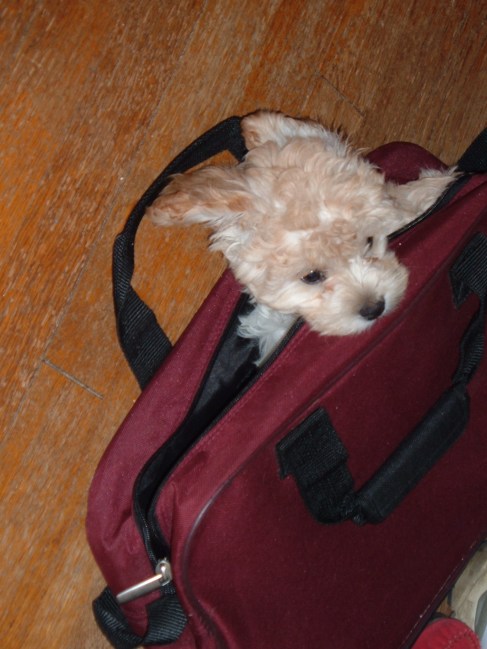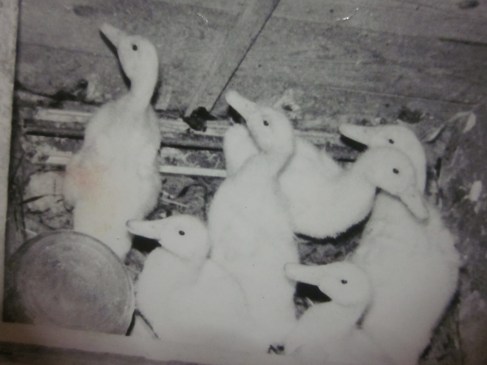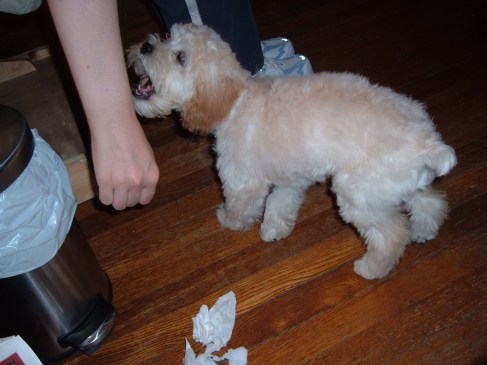We took Cricket on vacation to Lake George one weekend, a few years ago. She slithered out of her car harness within the first thirty seconds of the trip, and then stood with her front feet on the seat divider and barked at everything she saw out the window for the six hour drive north.
We found a motel that accepted dogs and wasn’t too expensive. And then we risked walking around town, but Cricket barked at everyone. Little children hid behind their parents. Grown men laughed, until they realized there was real bite behind her bark. We stayed in after that. Cricket spent the whole night standing on my bed, barking at every noise in the motel, and jumping on my feet like an alarm clock with sharp toenails.
The next morning, we walked behind the motel, where there was a tiny scrap of beach, with a dock and a few boats. We rented a row boat, two oars, and three life preservers. Cricket was not thrilled when one of the life preservers was wrapped around her waist, and she held onto my shoulder and dug in with her nails when I tried to carry her into the boat. Water is not her favorite thing, even tiny bathtub shaped water or raindrop shaped water, let alone a huge lake full of the wet stuff.
Once we were safely in the boat and away from the dock, though, she settled down. Pretty soon, she fell asleep to the lapping of the lake water at the sides of the boat. I was still antsy. I worried that we wouldn’t recognize our particular dock once we were out into the belly of the lake. And I worried that we’d lose an oar and I’d only be able to row in circles and never make it back to dry land. But once we were out far enough, and I couldn’t see the crowded line of beaches with the crowded row of motels behind it, I started to relax. I didn’t feel guilty or anxious or worthless or angry or frantic to accomplish something. Maybe if we had stayed out on the water longer, all of that noise would have filtered back into my head and found its normal level, but for a few minutes, there was peace.
When we rowed back to shore, I wasn’t quite ready to leave yet. I asked Mom if she would mind if we sat out by the motel’s pool for a little while before getting in the car for the ride home, and Mom and Cricket both agreed to the plan.
There were leaves at the bottom of the pool, and maybe some algae scattered around, so I didn’t have to actually go swimming. Cricket sat with Mom on a beach chair, and I sat on the side of the pool and dangled my feet in the water. It was the manageable compromise for me, between what I wanted to do (swim) and what I could tolerate. Swishing my legs in the water was nice.
I wish, instead of a vacation, I could move into a nice little house, with a washer and dryer and a dishwasher and central air conditioning, and a backyard pool, where I could swim without worrying who would see me. I’d probably still wear a t-shirt and shorts over my bathing suit though, just in case the back yard fence wasn’t high enough.
That vacation to Lake George was the last one we all took together. I get too anxious, about Cricket barking at strangers, about money, and about not getting enough work done to really enjoy the trip. But mostly, I have the same object permanence problem babies have. If you cover my eyes and I can’t see home, I’m not sure it exists anymore. Going away on vacation makes me think I’ll never be able to go home again.
So, Mom goes on vacations by herself, or with her friends, and Cricket and I stay home, and worry about her. That’s the manageable compromise we’ve come up with, for now.






